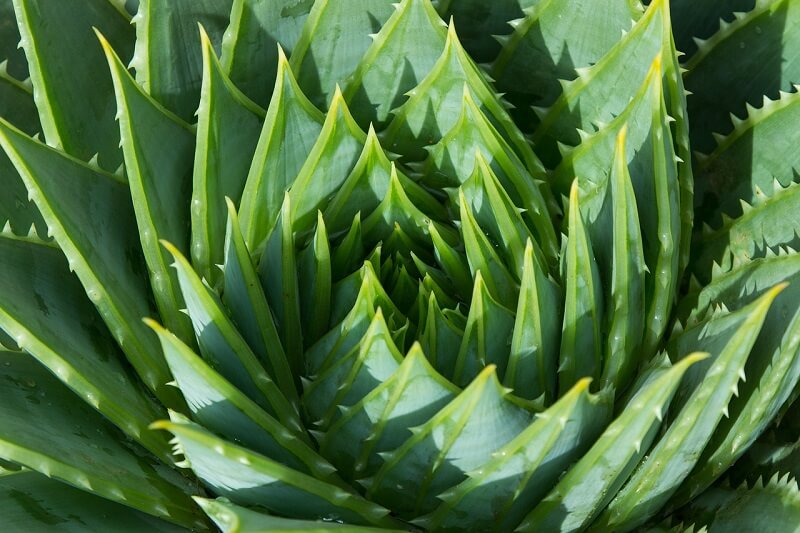Aloe - application and properties
- Aloe - a handful of information
- Aloe - nutritional content
- Aloe for the skin
- Aloe for the digestive system
- Aloe for the immune system
- Antidiabetic properties of aloe vera
- Aloe Vera and Cancer
- Use Aloe Vera?
- Contraindications to the use of aloe preparations
- Summary
Aloe vera can be helpful in the fight against many diseases. Its positive effects on the human body are widely known. It is valued for its soothing effect on the skin, helps treat burns, and accelerates the regeneration of injured areas. This plant has found numerous applications, particularly in the cosmetics industry. In addition, we can use it in many forms. One undisputed advantage is its broad spectrum of effects on the human body. Today we're bringing the popular aloe vera into the workshop.
Aloe - a handful of information
We can distinguish up to 500 species of this plant, the vast majority of which originate from the areas of present-day Africa. The most widespread variety is Aloe vera, interestingly, it is practically non-existent in the wild. After all, this variety contains the most health-promoting substances. Aloe is a succulent, that is, a plant that has adapted to life in conditions of limited water availability, has developed water tissues for its storage and a number of other adaptations in structure and physiology. It contains almost 99% water in its composition. The properties of aloe have been valued for centuries. It was used for burns and various wounds because it accelerated skin regeneration. It was also used as a remedy for stomach ailments and joint pain. Its beneficial effect on the skin was appreciated. Aloe was also used to embalm the bodies of the dead.
Aloe - nutritional content
Aloe vera contains many valuable ingredients—it has a total of 75 potentially active substances. Its pH is close to 4.5, which in turn corresponds to the pH of human skin. This is why it is so highly valued in cosmetics. It contains many enzymes, including aliases, alkaline phosphatase, amylase, bradykinase, carboxypeptidase, catalase, cellulase, lipase, and peroxidase. Bradykinase has anti-inflammatory properties, especially in the skin, while other enzymes are involved in sugar and fat metabolism. In addition, it contains several vitamins. Among them, we find vitamins C, A, and E. It is also a source of vitamin B12, folic acid (vitamin B9), and choline (vitamin B4). Among minerals, we also find many, such as magnesium, calcium, chromium, copper, and manganese. It also contains sodium, potassium, and zinc. These minerals are necessary for the proper functioning of enzyme systems in various metabolic pathways.
Aloe vera provides anthraquinones, phenolic compounds with laxative properties. They also have analgesic, antibacterial, and antiviral properties. It also contains plant steroids with anti-inflammatory properties. It also contains hormones, auxins, gibberellins, and many amino acids.
Aloe for the skin
Aloe vera , or rather the chemical compounds it contains, can be helpful in moisturizing our skin. It facilitates the hydration of the skin tissue by retaining water. This makes the skin firmer, smoother, and smooths out wrinkles. Aloe vera gel has also been shown to accelerate the healing of wounds and first- and second-degree burns. It is widely used in the treatment of sunburn. Its antibacterial and antifungal properties also play a significant role. It prevents skin inflammation and helps maintain its natural pH. It improves microcirculation, nourishes the skin, and helps it regenerate properly. It can also be helpful in the treatment of psoriasis, eczema, acne, and can smooth post-acne lesions. However, in regions where it occurs naturally, it has been used for centuries to rinse the mouth, eliminate unpleasant odors from the mouth, and treat burns and erosions.
Aloe for the digestive system
Aloe vera is a plant used to combat digestive problems. It is recommended for indigestion and in the treatment of stomach ulcers. Thanks to its antibacterial properties, it can be effective in the fight against Helicobacter pylori. It also has a hepatoprotective effect. It can prevent diseases such as liver cirrhosis or damage caused by various medications. Phytosterols, on the other hand, can prove indispensable in the natural process of lowering LDL cholesterol and triglycerides in the blood.
It facilitates digestion by increasing the secretion of gastric juice and bile and enhancing intestinal peristalsis. Aloe juice also acts as a powerful laxative thanks to the aloin it contains. Numerous institutions, including the World Health Organization, have recognized its laxative effect and confirmed it through numerous scientific studies.
Aloe for the immune system
Aloe stimulates the immune system. Supplementing with this plant increases the viability of macrophages and their effectiveness in fighting pathogens. Studies have shown that it can also increase the production of cytokines, cells actively involved in the body's immune response. This effect is related to acemannan and glycoprotein lectin.
Antidiabetic properties of aloe vera
Numerous scientific studies conducted on this plant have demonstrated its positive effect on blood glucose levels. This is due to the plant phytosterols it contains. Polysaccharides increase insulin levels and have a hypoglycemic effect. In addition to lowering blood glucose levels, aloe vera also supports the process of weight and body fat reduction. Such studies were conducted on a group of patients with prediabetes who were already struggling with type 2 diabetes. Aloe extract improves carbohydrate metabolism and has a positive effect on pancreatic function by improving its efficiency in insulin secretion.
Aloe Vera and Cancer
The effect of aloe vera extract on cancer is not yet fully understood. However, there are increasing reports that it has a real influence on the development of these diseases. One theory is that the cellular response to aloe vera components begins with the activation of cellular receptors, followed by the MAPK and PI3K-AKT pathways. This can prevent the formation of carcinogenic compounds in our DNA with benzopyrene. Furthermore, by enhancing the body's immune response, it can help eliminate cancer cells that have already formed. Emodin, a plant-derived anthraquinone, is used in the production of modern cancer drugs. Together with aloin, it inhibits the growth of the vascular endothelium.
Use Aloe Vera?
It is available in various forms on the market. The most popular is aloe vera gel. It is obtained directly from the cut leaf. Aloe is widely used in cosmetic products. We find it in creams, lotions to moisturize the skin, face masks and hair shampoos . It is an ingredient in cleansing gels, toothpastes and cosmetics for eyelid and eye care. Drinking aloe vera juice is also popular. We can add it to cold drinks, but it can also be drunk on its own. Aloe vera oil can also be an interesting form. It is obtained by macerating aloe leaves in vegetable oil for 3 to 5 weeks. It can be used to moisturize the skin and as a massage oil.
Contraindications to the use of aloe preparations
The main contraindication to the use of aloe vera preparations may be an allergy to the compounds contained in the plant. Pregnant women should also be cautious because the constituents of aloe vera can cause excessive uterine contractions and increase anxiety in nursing mothers. With persistent diarrhea, there is a risk of water and electrolyte imbalance. This is due to the laxative effect of aloe vera preparations. Long-term use of aloe vera can also irritate the mucous membranes of the stomach and intestines. When using aloe vera in children, you should consult your doctor beforehand. Despite its beneficial effect on lowering blood sugar levels, diabetics should not abuse it. This can lead to episodes of hypoglycemia.
Summary
Finally, aloe vera is a plant that is safe for our bodies. It can be helpful for skin conditions. It can also support the digestive and immune systems and aid in the treatment of diabetes and prediabetes. As with other plants, the most important thing is the dosage. For this reason, one should not overdo it with its amount in the diet. However, as part of a healthy and balanced diet, it will work perfectly.
THE PUBLISHER'S CHOICE
Dried plums 1 kg BIOGO
- €7,01
- €7,01
- Unit price
- / per
Dried White Mulberries 500 g ORGANIC
- €5,84
- €5,84
- Unit price
- / per
Almonds 1 kg BIOGO
- €11,69
- €11,69
- Unit price
- / per
Cranberries sweetened with apple juice organic 1 kg BIOGO
- €16,37
- €16,37
- Unit price
- / per
Dried dates 1 kg BIOGO
- €4,21
- €4,21
- Unit price
- / per
Unpeeled buckwheat groats 1 kg BIOGO
- €2,81
- €2,81
- Unit price
- / per
Walnuts 800 g BIOGO
- €8,65
- €8,65
- Unit price
- / per
Peeled sunflower seeds 1 kg BIOGO
- €3,04
- €3,04
- Unit price
- / per
PULLED ORGANIC SUNFLOWER SEEDS 1 KG BIOGO
- €4,44
- €4,44
- Unit price
- / per












































































































































